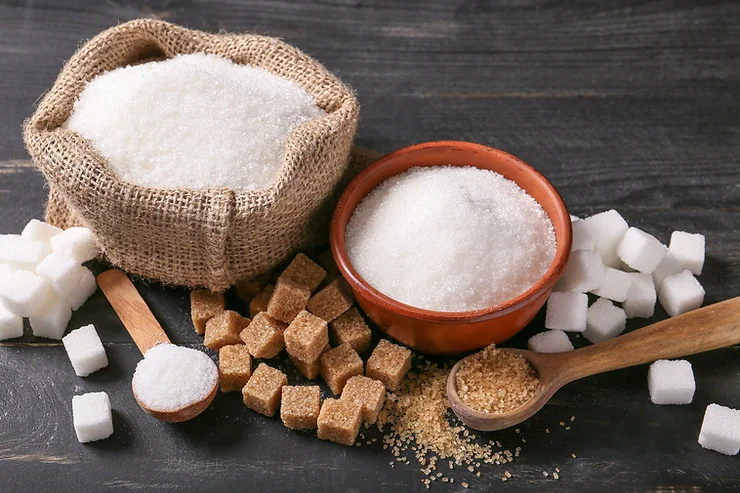Sugar can be tricky when it comes to weight loss and over all being healthier. What is sugar? Does sugar cause weight gain? What strategies can we take to help reduce sugar consumption?
A little science in your day! Let’s jump right into what sugars are.
Sugar is an essential part of the backbone of DNA, powers our cells, we can store it for later to help convert sugar to energy. Sugar isn’t just the little white crystals that we put in our tea; actually, sugar is a group of molecules that have similar structural makeup.
Part of the sugar family:
- Glucose
- Fructose
- Galactose
- Sucrose (a mix of glucose & fructose; table sugar)
- Maltose (a mix of glucose & well glucose)
- Lactose (galactose & glucose; found in dairy products)
Sugar is involved in all subcategories of carbohydrates and the more complex the make up is of these types of sugars, the slower we digest them, keeping us fuller longer. Just know that sugar is a type of carbohydrate, but not all carbohydrates are sugar. This concept goes both ways, with some carbohydrates break down easier into sugars, but some don’t. Just know that not all carbohydrates are used or treated equally in the body.
The macronutrients that are part of this mix are:
- Fiber (like husks or whole grain)
- Starches (potatoes or rice)
- Structural building blocks (shells of crustaceans like chitin, or like cellulose that make up trunks of trees)-
Now that we had a quick overview of sugar’s make up and what sugars provides for our bodies, lets dig into why it can cause weight gain.
In general, we need to first understand that over consumption of any type of food can cause an energy surplus to where our body can either use it as energy or store it. This is the key indicator of weight gain, from 1971-2006 on average the caloric intake has increase by 300 calories daily due to more added sugar and added fats to food.
The baseline for obesity and the average for Body Mass Index has increased.
A sedentary lifestyle, a lack of physical activity, higher stress levels, and lack of sleep; on average body fat percentages have increased. The average body fat percentage for males is 28% and the average for females 40%. In general, a healthy body fat percentage for men is 11-22 % and for women 22-33%. Lower percentages are considered healthy but in the category of athletic and lean.
Processed foods will have more processed ingredients, sugar, and salts with reduced amounts of nutrients. Meaning our bodies will break down the food faster, our body will crave more due to the lack of nutrients, the sweeter more desirable taste, and will release dopamine, the pleasure sensory part of the brain. This combination is a good indication of over consumption of those tasty treats.
Sugar does not nourish us, does not add a ton of nutrient value nor does it provide us with vitamins, minerals, phytonutrients, antioxidants, fiber, or water. Sugar along does not cause most chronic health problems like diabetes or hypertension.
Asking if sugar causes weight gain by itself is a simple question to a complex answer. Sugar alone will not cause weight gain; but adding in other factors that can contribute to overconsumption can cause weight gain. Other factors that can contribute to weight gain; imbalanced portions, lack of sleep, high stress levels, metabolic health, the type of live style you have, and social environment can impact all of these. Everyone reacts differently with food consumption, this is likely due to genetic differences, individual hormone satiety differences from fat vs carbs. Our gastrointestinal tract is a play in managing our weight as well because of all the different types of bacteria that inhabit it.
Some strategies to consume less sugar through your day.
- Eat a protein with each meal, this will keep you fuller for a longer period to where you won’t have your insulin levels crash, inducing a hangry feeling.
- Eat all your meals slowly and mindfully, take at least 15-20 minutes to eat.
- Drink water with every meal and consume up to 2-3 liters of water a day, to maintain hydration levels.
- Eat 5+ fruits and vegetables daily, keep a big variety and colorful. Eat that rainbow!
- Find ways to reduce stress without turning to food. Break the cycle and find something that makes you feel good!
- Tracking your food with measuring tools, hand portioning, or myfitness pal is a great way to understand and physically see what you are consuming daily. This is a great practice to help you understand portion sizes as well.
- Do not drink your calories, these sneaky little sweet treats add up quick and give you no nutrients.
- Everything in moderation!
- Building better habits and breaking any habits that you have with food will help with overall reduction of sugar.
I hope this post help you understand that everyone is different, and you must be your own scientist to find what works best for you. Experiment and record, get the data and compare what works out better!
Reference:
1. Brian St. Pierre, MS, RD, Krista Scott-Dixon, PhD. “The Surprising truth about sugar.” https://www.precisionnutrition.com/truth-about-sugar. Precision Nutrition.
2. Dieter B. “Is sugar really bad for you? Yes and no! Here’s why”(July2019). https://blog.nasm.org/nutrition/is-sugar-really-bad-for-you-we-separate-fact-from-fiction-evidence-from-hyperbole-and-give-you-the-best-answer-on-sugars-true-place-in-our-lives NASM.

